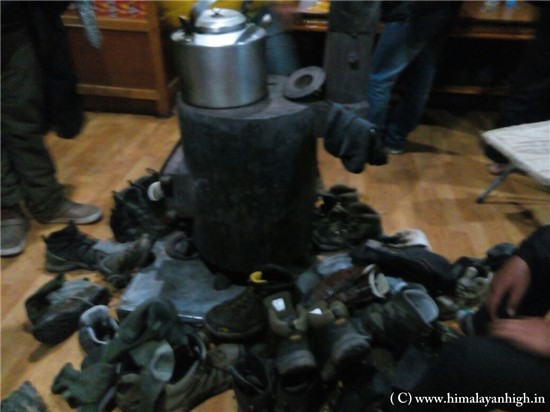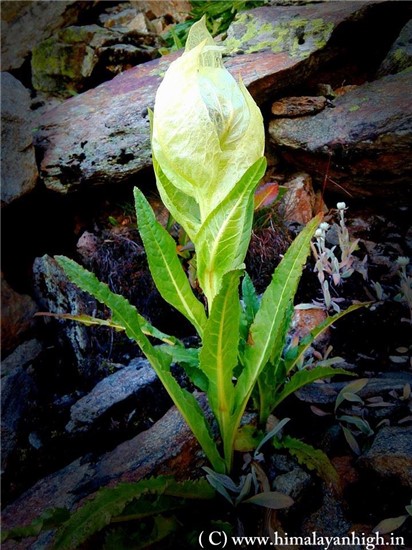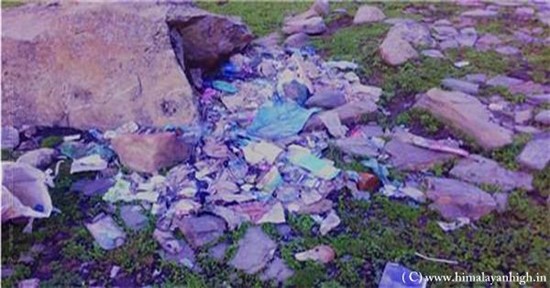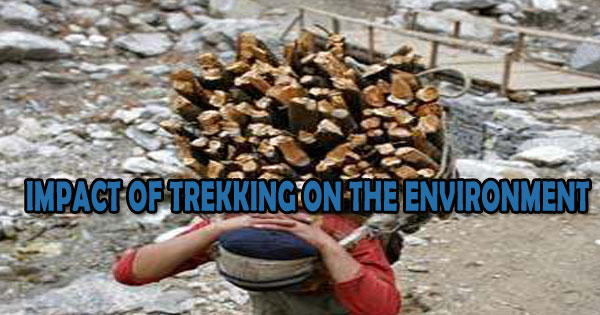Venturing deep into the Himalayas give you a memorable experience for lifetime, but it comes at a cost, not just your time and money, but also at the cost of our fragile nature which is the root of our very own existence !! Listed below are few of the impact of trekking on the environment which we could think of.. perhaps there are lot more
Pressure on natural resources: Trekking impose a huge pressure on the natural resource of the land, most preciously on the fire woods for the extra warmth and fun of camp fire. Often campfire are not a sheer necessity, but used for fun and not on every occasion importance is given to create a low impact fire. Earlier, on treks fire woods used to be used for cooking as well imposing a lot of demand on the resource, but luckily now, for the good, trekking groups carry either a kerosene stove or gas cylinders which releases the pressure on the it. Even on tea house facilitated treks like Sandakphu in India, or other treks in Nepal, part of the pressure is absorbed by cooking on gas, but cooking on fire wood is still practiced on these treks majorly, specially for continuously boiling water.
Other forms of pressure are the wild plants which some locals eat. Closer to the villages, they can be cultivated and consumed, but in the deeper treks, that should not be practiced. Himalayas are home to lots of species of medicinal plants and flowers. They are plucked by the locals and sometimes even the trekkers. Most common example of this can be the Brahma Kamal and Junipers which are found on higher altitudes. The caravan of mules joining the group does not help much which put further pressure on the natural resource.
Bigger the group size, higher is the pressure on the natural resource.

use of firewood to dry wet shoes on a trek
Soil erosion: Deforestation leads to soil erosion. The demand on the forest wood for cooking and fun activities increase deforestation. Construction of tourist infrastructure also results in deforestation but it has other advantages in the long run to sustain the growth. We all know the long term effects of soil erosion which causes unnatural degradation of the mountains and even causes landslides and rockfalls.
Widening of trail and destruction of plants due to trampling. Trekking causes trampling and it causes to widen the trail, create multiple trails and also increase soil erosion. It is advised to stay on the single trail when on trek and not to take short cuts on a new route. Trampling spoils the plantation and reduces regeneration. It damages the stems and results in no growth making it a new trail. On the other hand, trampling also damages the soil quality and water permeability.

Brahma Kamal, rare Himalayan Flower are plucked for medicinal value, decorative purpose, curiosity and offerings to god
Non-Biodegradable waste. Perhaps the most talked about problem in the mountains. The litter of non-biodegradable waste by trekkers and the staff accompanying them is offcourse the most of the serious problems for the environment. Trekkers often venture deep and high into the mountains where there is NO MUNICIPALITY to take care of your waste, if at all they worked, even in the cities and towns. Plastic forms a major cause apart from tin cans and glasses. The problem plastic has on the environment are well know and to list few of them , we may go with
- Degrade soil fertility
- Lessen soil water permeability
- Change the chemical composition of the soil
- Block water sources causing a breeding ground for diseases
- The roots of small plants cannot penetrate through them
- Disturbs the scenic beauty of the place

waste left over by trekking groups in Kashmir Great Lakes Trek, India
| Product | Time to Biodegrade |
|---|---|
| Paper towel | 2–4 weeks |
| Newspaper | 6 weeks |
| Apple core | 2 months |
| Cardboard box | 2 months |
| Wax coated milk carton | 3 months |
| Cotton gloves | 1–5 months |
| Wool gloves | 1 year |
| Plywood | 1–3 years |
| Painted wooden sticks | 13 years |
| Plastic bags | 10–20 years |
| Tin cans | 50 years |
| Disposable diapers | 50–100 years |
| Plastic bottle | 100 years |
| Aluminium cans | 200 years |
| Glass bottles |
Undetermined
|
Chemical contamination of food and water consumed by wild animals disturb their mental health. May be you thought that leaving behind some food is OK as it is bio degradable, but not always are you correct. Mostly preserved food are taken on treks and these contain chemicals which are harmful for the animals in the long run. There are examples of genetic changes occuring in animals due to consumption of chemical waste. So not all products that are biodegradable are good for the environment. So is the contamination of water by detergents and soaps not good. Keep the food chain in mind.
Frequent sighting of humans by wild animals disturbs their natural instincts. Wild animals are shy and love to be on their own. Human intrusion into their territory disturbs them. It effects their mating cycle and also psychology effects their mental health for which they might need to face consequences. They might loose the fear of human which can bring the closer to the humans building a platform for a clash. The vice versa may also result in clash. History is a proof of the effect of animal and human clash, but remember we are all related to each other !!
Faecal contamination of soil and water bodies: This has very much to do with chemical contamination of the soil and water. We humans eat lots of chemicals in the form of preservatives in our food. Wild animals and plant do not. Improper disposal of faecal and other human waste pollutes the area. Sometimes, even proper disposal does.

Cascading effects. Probably the worst of all. We humans have the tendency to follow and be irresponsible until the problem hovers on ourselves. A dirty place will be further piled upon with a dump. We leave things upon our followers saying or thinking that he or she or them following will do the clean up job, without even thinking that they are thinking the same too, until a LEADER walks on that path. Our this particular manner has even costed life in mountains like Everest, keep aside cleaning a area.
With these many listed impacts on the environment, I just imagine what all may be the unlisted ones, which did not hit my mind !!
But does that mean we do not trek and see the beauty of the nature ? We too are Nature's own creation !! Should we stop our friends from trekking ?? Should we not allow our future generations to experience the wonderland ?? No, the answer is NOT. We Do Not have the right to do so.
Only WE can make it better. Only WE ourselves can help us out of this. Its US who together can solve this problem. We just need to be Responsible Trekkers, Practice it and Preach it. In each of our actions, we need to lead by examples and not just make it a SLOGAN !!
Hope for the best !!
this blog also appears on: https://himalayanhigh.in/impact-of-trekking-on-the-environment

No comments:
Post a Comment